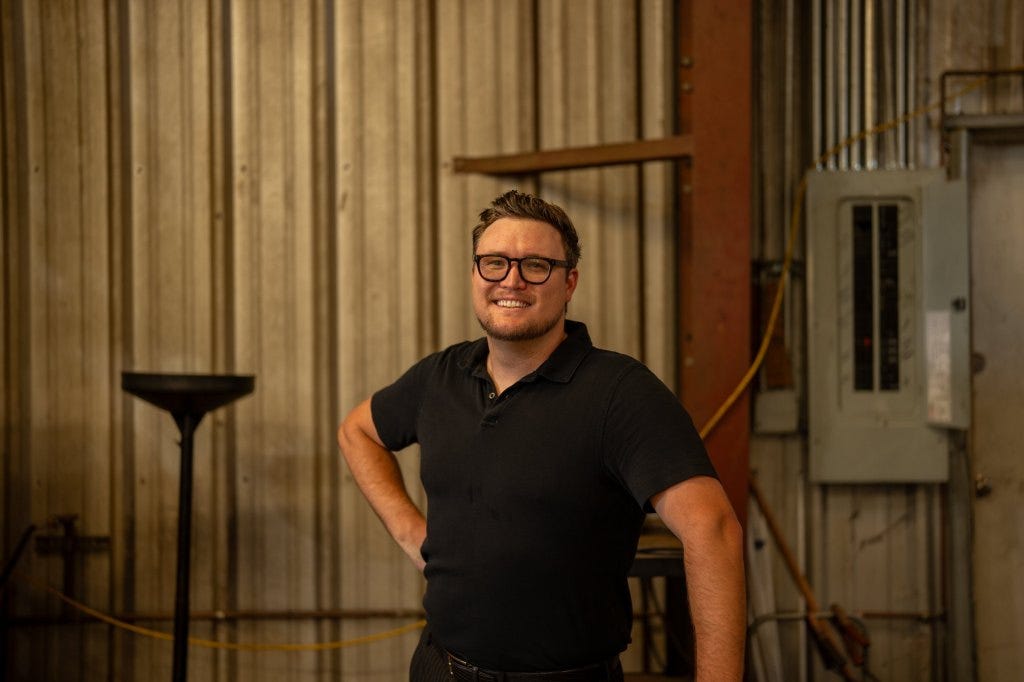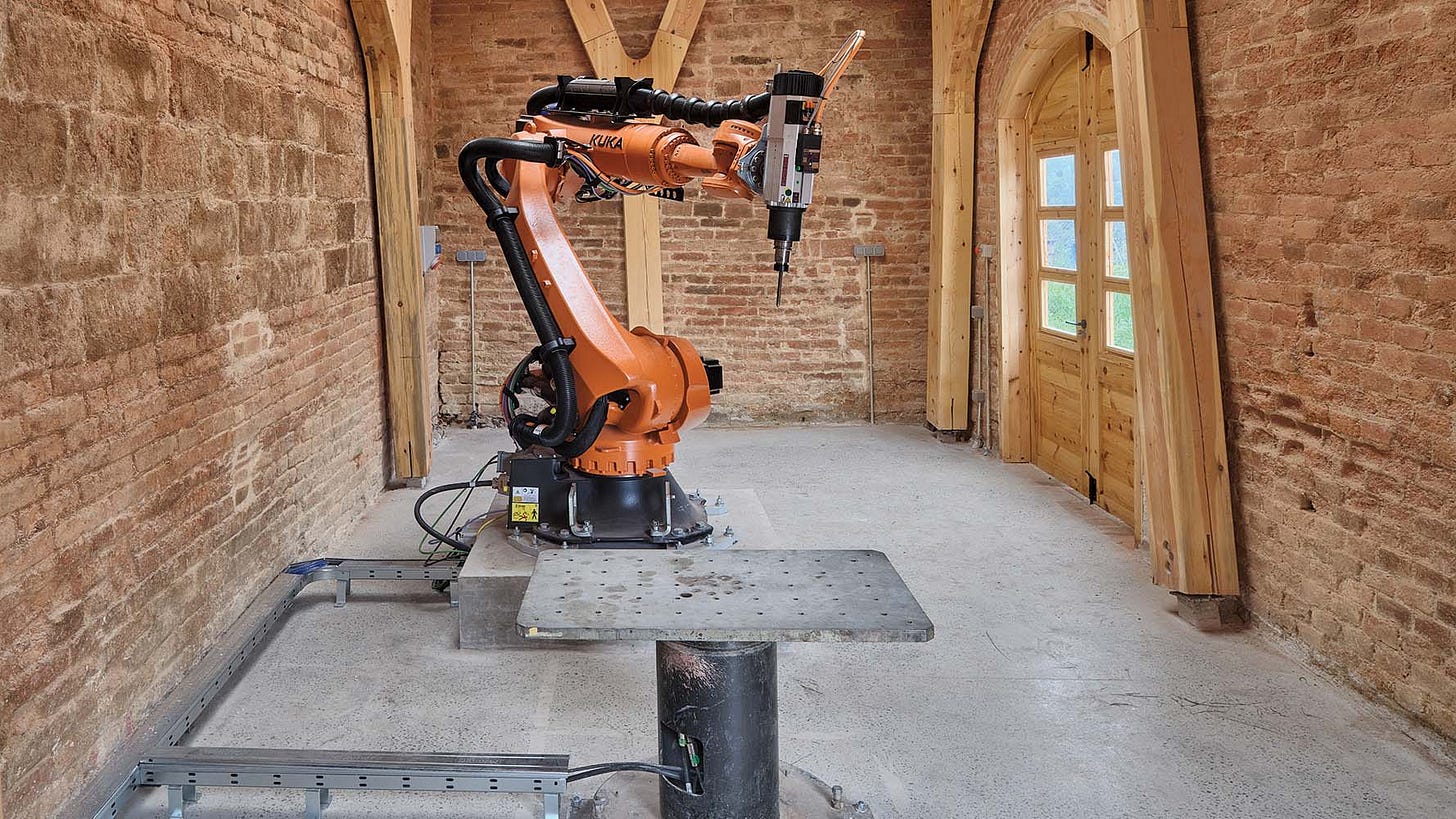HIGH MIX: Future of Reindustrialization for May 26, 2025
Beer, Ketchup, Drones and Laser Punches. Hippie footwear leaves Oregon for Kentucky.
Welcome to HIGH MIX, our weekly newsletter about the reindustrialization of the United States.
A note: rather telling that typing “reindustrialization” into a text box auto-corrects to “deindustrialization,” isn’t it? We might have to write a polite email to a few operation system vendors.
“My solution to Trump’s tariffs: I’m starting a U.S. factory to save my small business” FORTUNE (link)
Tenikle CEO Hans Dose describes in detail the hurdles he’s had to overcome to reshore the manufacturing of his company’s products. It’s a plethora of problems, but comes with some interesting upsides as well—faster lead times and the ability to better insulate the business from IP theft, to name a few. It’s a commendable effort.
Expansion / Investments
“Anheuser-Busch invests $300M to boost manufacturing careers, veteran employment” FOX BUSINESS (link)
Couldn’t be more proud of Anheuser-Busch. The brewing behemoth announced a large investment in modernizing their US-based facilities, and a concerted effort to hire more veterans who are seeking employment in manufacturing—driving their stock price to a 52-week high. Their CEO Brendan Whitworth is a veteran himself—a former Marine and operations officer at CIA.
“Exclusive: Ketchup maker Kraft Heinz investing $3 billion upgrading US manufacturing” REUTERS (link)
With 30 plants across the country providing an estimated 20,000 jobs, Kraft Heinz is one of the largest American food companies. The $3B investment is their biggest push in over a decade, with the intent to raise production efficiency and future-proof the company. I’ve grown out of my Lunchables phase [Speak for yourself —Ed.], but it’s comforting to know the tomatoes in their ketchup are grown in California, and Ore-Ida potatoes still come from Idaho.
“Keen quietly closed its Portland factory” OREGONLIVE (link)
Keen Footwear is one of a small number of US-based shoe-makers, with a third of their products being made stateside. The company closed its Portland facility, citing “long-term strategic and operational advantages”. They’re now transitioning to a new factory in Kentucky with a footprint of 60,000 square feet—double the floor space of their Portland location. (If you have square feet and a large footprint, Keen claims to offer a much wider toe-box than other brands.)
Kentucky is a right-to-work state; Oregon is not.
“TRUMPF Inc. opens new $40 million Smart Factory in Farmington” FOX61 (link)
Machine tool company Trumpf Inc. make machines to make machines: 2D and 3D laser cutters, press brakes, laser punches, etc. Their new “smart” factory in Farmington, Connecticut might help ease the apparent shortage of available high-end machines for a growing number of shops around the US that need these tools for bending and laser-cutting sheet metal.
Made In The USA
“Skyfish Launches Osprey: A New American-Made Drone Designed to Compete with DJI” Drone Life (link)
Chinese manufacturer DJI (Da-Jiang Innovations) currently holds 70% of the market share in the drone industry—which isn’t ideal for several reasons, including national security—but that is set to change as the US begins its transformation into a small electronics powerhouse. Something I’ve heard quite often (despite being technically untrue*), is that “We can’t make consumer drones in the United States” due to a lack of domestically produced components like motors and onboard electronics. The Skyfish Osprey looks promising as a truly American-made replacement for smaller DJI drones—widely used by law enforcement agencies and consumers alike—which are currently under scrutiny for the FY25 National Defense Authorization Act (NDAA).
* What is true to my understanding is that we don’t have as inexpensive drone rotor motor options as China, but several American startups are tackling this.
“Exclusive: Walmart expands support for American-made products” AXIOS (link)
Manufacturers with a Small Business Administration (SBA) certification are now eligible for additional resources from Walmart. Their “Grow with US” program is hosting an “Open Call” event—in essence, an opportunity to pitch your product line to Walmart—with applications opening June 24th. There will also be pop-up events across the country throughout May and June, where small-to-medium sized companies can potentially get to the front of the line, or a “fast pass” as CEO John Furner puts it.
“Experiment: Will Consumers Really Pay More For American-Made Goods?” FORBES (link)
“The Shower Head Experiment” sounds like the name of a funk band, but premium shower head manufacturer Afina thinks it demonstrates the power (or weakness) of “Made in the USA” marketing. For the experiment, the company advertised the same product as either “Made in Asia”, or “Made in the USA”, with the American-labeled product being sold at an 85% mark-up. Unsurprisingly, no one bought the more expensive option. While the experiment wasn’t optimized within a proper marketing “Good/Better” structure, it highlights the need for a more positive realignment of consumer sentiment around American made products.
Statistics / Projections
“Just how many jobs and GDP dollars do US clean energy factories create?” CANARY MEDIA (link)
American clean-energy industry is in flux, and under the spotlight both in Congress and on Wall Street. A new report from the American Clean Power Association aims to clarify the current state of affairs. I was shocked by some of the figures: the average salary in solar manufacturing is nearly double the average US worker’s salary at $134,000, and each clean energy job results in a further three jobs in various supporting industries. 73% of the 200 operational factories are located in Republican-leaning states, which can have ramifications for politicians currently debating energy tax-credit policy.
Many of the Biden IRA solar incentives are set to be removed in the budget moving through Congress. That seems slightly premature, especially in consumer/residential programs, but what also seems possible is that USA-based solar will be carried through to wider adoption and lower prices on the back of large-scale commercial + battery implementations.
“Reshoring the Power Grid” T&D WORLD (link)
You can’t make lots of stuff without lots of energy. In TOOL OR DIE’s latest interview with Jim Belosic of SendCutSend, he described the need to bring in increasingly more power for their hungry machines. It’s yet another hurdle in the effort to reshore manufacturing stateside—with increasing lead times on things like large transformers (many of which are made in China, especially the lowest-end ones), and the additional time necessary to install, test, and power factories either being newly built or upgraded. Thankfully, large investments are being made to balance demand with output, and it might not slow down reshoring initiatives very much.
Regulation / Systems
“Let's prepare for the reshoring wave” THE FABRICATOR (link)
The Manufacturing Extension Partnership is a powerful tool for small American companies, who are dog-eat-dog with shops overseas which are often operating in a heavily subsidized environment. It’s critical this backing isn’t removed or hampered by the current wave of spending cuts. It seems to be safe for now, with strong bipartisan support in Washington as Congress seeks to boost its reshoring efforts.
“Small Machine Shops are New Targets for Ransomware” AMERICAN MACHINIST (link)
Small machine shop operators have to weigh the expense of keeping equipment up-to-date against those risks, and it can be headache-inducing to plan and manage security upgrades without consulting an expert. Despite ransom payments ranging into the millions of dollars, many companies continue to pay instead of investing in training employees to identify malicious emails or links or hardening network configuration and firewalls. This is short-sighted, especially in manufacturing: As American manufacturers regain market share from their foreign competition, I expect this type of industrial sabotage to increase in frequency and sophistication. Is paying a ransom and losing your IP to a foreign competitor worth it?
“Will Anyone Take the Factory Jobs Trump Wants to Bring Back to America?” WALL STREET JOURNAL (link)
Proud Americans working before the ‘70s offshoring wave began might have turned up the BTO’s “Takin’ Care of Business” without considering its mild lyrical critique of factory working conditions. Yet the average American today seems to have an even less nuanced idea of what it means to work for large manufacturers. (Perhaps due to the increasing commonality of quick-and-easy gig-economy jobs—not very glamorous either, offering similar or worse pay—but without the hazards, noise and perceived low social status of being a factory worker.) But if people don’t apply, factories may be forced to modernize and automate those positions.
Innovation / Flexes
“IAAC Students Build a Nature-Inspired ‘Cathedral’ for Robotics Near Barcelona” ARCHITECTURAL RECORD (link)
With 52 unique joints, organic patterns and materials, student-artisans from the Institute for Advanced Architecture of Catalonia created a cathedral using a modern miracle: a six-axis industrial robot from KUKA.
Our latest podcast with the people helping reindustrialize the United States.
TOOL,OR DIE goes inside the race to reshore critical industries, one factory at a time. Join us for deeply technical conversations with the innovators, large-scale operators, defense investors and engineering grognards rebuilding American manufacturing from the shop floor up. We are independent and growing—tell your friends and neighbors to give us a try.







